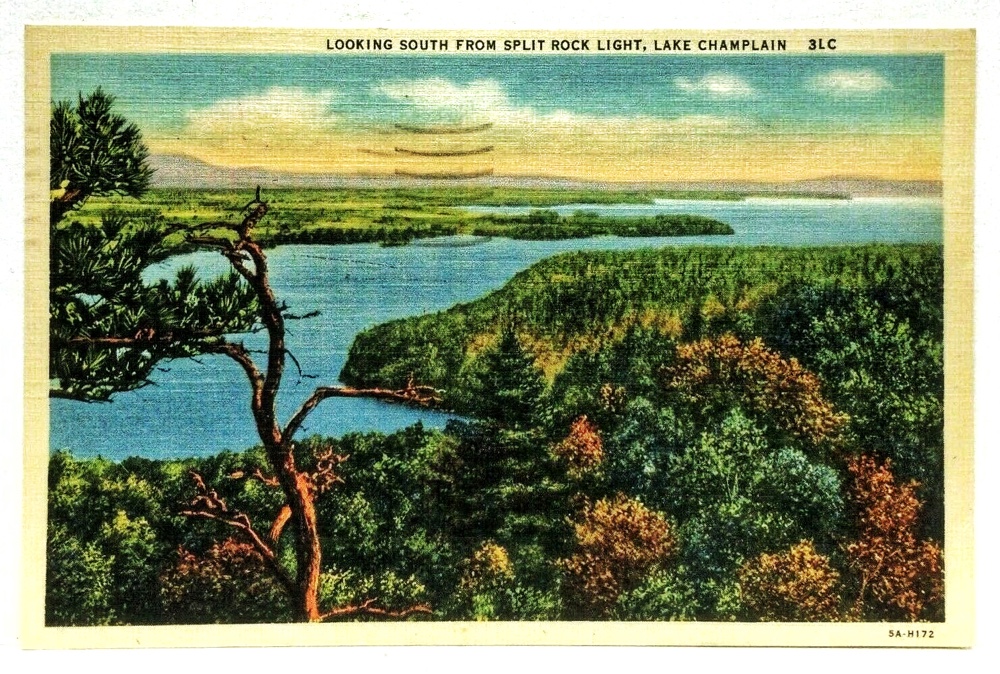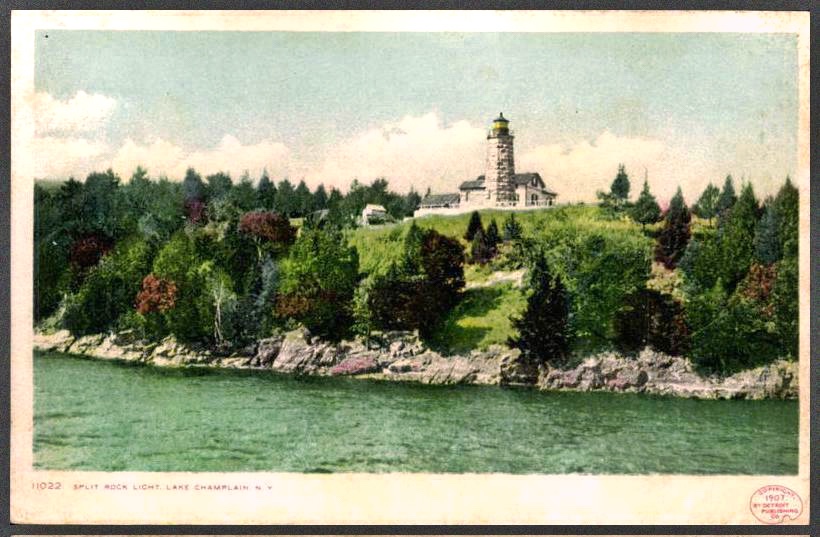In the vintage postcard above — faded, blurred, and stained with touch and time — the historic lighthouse located at Split Rock in Essex, NY reigns over a promontory bearing a curious resemblance to an arboretum, more landscaped and less wild than today. A copse of diverse specimen trees here, a granite outcrop there, a grassy bluff here,… I can’t help but see a sort of Split Rock botanical garden. But it wasn’t. I imagine the photographer and postcard publisher were likely thinking of the flora and topography as mere garlands for the centerpiece, the focus of the postcard: Split Rock Lighthouse.
There’s something comely about an old lighthouse, a spire of stone stacked skyward to secure a lofty perch for a sweeping beam of light. Bold, dependable, comforting. Or is it? Perhaps it’s just a tall tower like a barn with a silo? Is tall bold? Is a fortress-like column comforting? We ascribe much meaning to lighthouses because of their function. They are predictable and dependable because predictable, dependable lighthouse keepers ensured that they were. Today, I suppose, that’s mostly the work of technology. Bold and comforting likewise derive from function. Stormy night, navigating challenging seas, unreliable visibility, a valuable cargo, and the wellbeing, heck maybe even the lives of the boat’s captain and crew,… And then a navigational beam cutting through the blindness, showing the way to safe port. Or at least around a potentially dangerous obstacle that might otherwise have scattered ship and crew, reducing their industrious mission to memory and flotsam and jetsam.
In short, we think of lighthouses, so often portrayed in photographs and other artwork, as visually equivalent to the function they fulfill. We conflate the building with service it enables. We deploy references to lighthouses with confidence that our audience will understand what we mean. We think in metaphor. We speak in metaphor. And, by and large, the viewer, listener, or reader understands what we wish to imply.
This Is Not a Metaphor
Seven years ago, I was hit by a truck. This is not a metaphor. I was crossing the street two blocks from home when the driver, blinded by the sun, rammed into me. During my nine-month recovery, I began to reflect upon my life… I realized that for years, I had been stuck on an endless hamster wheel… I remembered the joke about the airline pilot who addressed his passengers over the intercom: “Attention: I have bad news and good news: Radar is down. We’re totally lost! But you’ll be glad to know we’re making very good time.” I knew I needed to make a change. — Susan Fassberg (Source: The Art of Looking – Reinventing Home)
The tragic accident, Fassberg assures us, is not a metaphor. Real truck, real sun, real collision, and real injuries. But the hamster wheel and the airplane trip? Metaphors. A pair of accessible and effective metaphors help Fassberg tidily convey her truth. She was stuck and needed to make a life change.
When Susan and I opted into the adventure of reawakening Rosslyn as our home, we knew that we needed to make a change. We were navigating disorienting liminal changes (personal, professional, financial, and even philosophical/ethical). In the midst of these tempestuous transitions, we latched onto a hope that Rosslyn would help us reboot. Rehab. Maybe reawakening a needy property would reawaken our own hopes, optimism, confidence. We were in need of a full system reboot. Unplug. Count to ten. Replug. And, in our infinite wisdom (read irony, ergo… our infinite folly?) we chose to believe that Rosslyn, in need of TLC (and possibly life support) herself, would be able to minister to us. Made perfect sense at the time!
We had not been hit by a truck. Not a literal truck at least. Perhaps a metaphorical truck. Or several metaphorical trucks. And the joke about the airline pilot? Really, really familiar. Only, purchasing Rosslyn didn’t exactly precipitate a safe landing. Not for a few years, at least. And, yes, we were lost before throwing ourselves at the feet of Rosslyn, and we were often quite lost during those first few years.
Sure, we needed change. But we basically leaped into the tumbling kaleidoscope of constant, unpredictable change, each juggle and bump triggering a dazzling aurora borealis of tumbling technicolor mystery. Mysteries. It was spectacular and intoxicating. And it was often disorienting. Sometimes it was debilitating.
Are you with me? Maybe 50-100% clear on what I’m trying to say?
No?
Me either.
Not a metaphor, I promised. And then, I dove into metaphor. Metaphors.
Sorry.
Sometimes what I want to say and what I think I want to say are like the nearly marooned boat captain and the fog-lancing lighthouse. Each reaching through the turmoil toward one another, but only occasionally, fleetingly connecting.
When in danger of becoming marooned, I tell myself, narrow the focus. Tack 90° or so in a different direction. Decrease distance to desired destination by abbreviating the current journey….
Projecting Passion & Lovestruck Infatuation
I’ve often used the words “smitten”, “seduced”, beguiled, enchanted… when referring to Rosslyn. I ought to be more specific. I used these fuzzy euphemisms when describing my personal relationship with Rosslyn. And, in an effort to be as candid as comfortable — hopefully catalyzing some sort of catharsis, some sort of eureka moment clarifying this sixteen year affair with a home — I insisted, especially early on after purchasing Rosslyn from Elizabeth and George McNulty, that he, George McNulty, seemed to have had an almost four decade long love affair with Rosslyn. I even once asked his son, Jason McNulty, what he thought of that observation. I don’t recollect him making too much of my peculiar characterization, but perhaps I’ll find the opportunity to revisit this over-the-top and totally unjustified hypothesis. I bring it up now because it strikes me as peculiar that I initially felt so certain, perhaps I even needed to understand the previous owner’s relationship with this property as being a sort of love affair, an enduring passion that ran parallel to his marriages. And peculiar that Susan and I adopted this anthropomorphic oddity in explaining our own relationship with Rosslyn.
I relied on this fuzzy explanation for our outsized investment of energy, resources, and life into an old house because it was a way of avoiding the complexity of our true relationship. I figured that my love entanglement language would simply be heard as metaphorical exaggeration. And I hastened to contextualize my own infatuation with the previous owner’s alleged love affair as if to suggest that this property had a certain charm that could only be approximated with the language of love and passion. We all tend to speak in hyperbole, especially when asked to justify odd, uncharacteristic, or extreme behavior. Certainly our family and friends would have been justified in describing our all-in obsession with Rosslyn as reckless, foolhardy infatuation.
But I suspect that most who’ve heard me claim that we were beguiled or smitten, never really took me literally. Perhaps I didn’t take myself literally. I’ve come to wonder if this is not a metaphor at all. Or if we’re unable to navigate, to grapple with loss and hurt and confusion and hope and optimism without the medicine of metaphor.
Why did I illustrate this post with Split Rock Lighthouse? Why did I borrow Susan Fassberg’s brave truth and then trip repeatedly over metaphor despite an sincere effort to come clean, to carve our some crystal clear truth? And why is it so comforting to include this second postcard above as I wander toward my conclusion-less conclusion to this post?
The vantage from the lighthouse, looking south, the postcard states (although its actually sort of southeast), across the northern end of the Split Rock Wildway, across Lake Champlain at the beginning of The Narrows, and then across Vermont toward the trailing end of the Green Mountain, this vantage is familiar. It is our metaphorical front yard. It is a significant reminder that our attraction to Rosslyn was, yes, a handsome old home and boathouse, but it was also this realm, this wild and overgrown invitation to let go… of so much. And to allow ourselves to gradually reawaken, to reinvigorate our hopes and dreams and to rediscover a future that had become stormy and confusing.
[I’ve just attempted to reread this post without hitting delete. What in the world am I wrestling with? And why is it so elusive? Damned if I know. Yet. But if you’ve made it this far, I apologize. Sometimes the captain navigates the ship. Other times the tempest itself seizes the helm!]


Leave a Reply